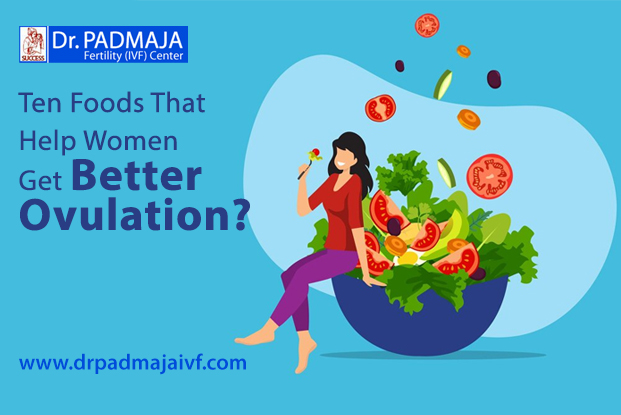When it comes to fertility, ovulation plays a crucial role in a woman’s ability to conceive. A fully developed egg is released from the ovary during ovulation, allowing sperm to fertilize it. While there are several factors that can influence ovulation, including age, lifestyle, and health conditions, your diet can also have a significant impact. In this article, we will explore ten foods that can help improve ovulation and fertility, and provide a few tips for women looking to optimize their reproductive health.
If you are seeking expert guidance on fertility and ovulation, renowned centers like the best IVF center in Hyderabad and Dr Padmaja IVF Center offer specialized treatments and personalized care for women facing fertility challenges. These centers provide comprehensive services to improve reproductive health and assist women on their fertility journey.
Here are ten foods that can support healthy ovulation:
1.Leafy Greens: Spinach, Swiss Chard, and Kale
Leafy greens are rich in folate, a vitamin that plays an important role in reproductive health. Folate is necessary for healthy ovulation and can help regulate menstrual cycles. Early in pregnancy, it also lowers the chance of birth abnormalities. Incorporating leafy greens like spinach, kale, and Swiss chard into your diet can support optimal ovulation.
2. Berries (Strawberries, Blueberries, Raspberries)
Antioxidants found in berries can shield eggs from oxidative damage. This is important because oxidative damage can impair ovulation. Antioxidants found in berries, such as vitamin C and flavonoids, support egg quality and may contribute to more consistent ovulatory cycles. Adding berries to your morning smoothie or yogurt can be a delicious and nutritious way to support fertility.
3. Full-Fat Dairy Products
Recent studies suggest that consuming full-fat dairy products like whole milk, cheese, and yogurt may improve ovulation. Low-fat dairy, on the other hand, may be linked to an increased risk of ovulatory infertility. Full-fat dairy products contain essential fatty acids that help maintain hormonal balance, which is crucial for regular ovulation.
4. Nuts and Seeds
Nuts and seeds, particularly chia seeds, walnuts, and almonds, are high in fiber, protein, and good fats. These nutrients help stabilize blood sugar levels, which in turn supports hormone production and regular ovulation. They also contain essential vitamins and minerals like vitamin E, zinc, and magnesium, which are vital for reproductive health.
5. Salmon and Fatty Fish
Fatty fish like salmon, mackerel, and sardines are high in omega-3 fatty acids, which are beneficial for hormone production and improving egg quality. In addition to lowering inflammation, omega-3 fatty acids may enhance ovarian health generally and enhance ovulation. Try to consume two servings or more of fatty fish per week.
6. Avocados
Avocados are an excellent source of monounsaturated fats, which can help support hormone balance and improve ovarian function. They also contain vitamin E, which is important for egg health and ovulation. Including avocados in your meals can be an easy way to boost fertility-boosting nutrients.
7. Eggs
Eggs are not only a great source of protein, but they also contain essential nutrients like vitamin D and omega-3 fatty acids. These nutrients are essential for maintaining healthy ovaries and supporting ovulation. Regular consumption of eggs can help improve overall reproductive health and enhance fertility.
8. Whole Grains (Oats, Quinoa, Brown Rice)
Whole grains are an excellent source of fiber and B-vitamins, which play a significant role in regulating hormonal levels. The high fiber content in whole grains helps manage insulin levels and support metabolic health, which is crucial for regular ovulation. Replacing refined grains with whole grains can be a beneficial dietary change for women looking to improve fertility.
9. Legumes (Lentils, Chickpeas, Beans)
Legumes are a great source of iron, folate, and plant-based protein. They can help stabilize blood sugar levels, which is important for preventing hormonal imbalances that can affect ovulation. Additionally, legumes are a good source of fiber, which promotes digestive health and overall well-being.
10. Citrus Fruits (Oranges, Lemons, Grapefruit)
Citrus fruits are packed with vitamin C, an antioxidant that helps protect eggs and supports hormonal health. Vitamin C also promotes healthy cervical mucus production, which is essential for sperm motility and fertilization. Including citrus fruits in your diet can give your fertility a natural boost.
How the Best IVF Center in Hyderabad Can Help
While improving diet and lifestyle can certainly have a positive effect on ovulation, some women may face more complex fertility challenges. If you are struggling with ovulation issues, seeking professional care is essential. Leading fertility clinic Dr. Padmaja IVF Center in Hyderabad is well-known for its cutting-edge IVF and IUI procedures, which can assist women with unpredictable ovulation or other fertility-related concerns.
Dr. Padmaja, a renowned fertility expert, offers personalized care plans to help women achieve successful conception. Whether you’re looking to address ovulation issues or explore other fertility treatments, Drpadmaja Fertility Center is committed to providing the best support through every step of the process.
Conclusion A balanced diet rich in fertility-boosting foods can significantly enhance ovulation and improve your chances of conception. While diet alone may not resolve all fertility issues, it is an important part of the equation. If you are facing difficulties with ovulation or fertility, don’t hesitate to reach out to a trusted IVF center like the best IVF center in Hyderabad for expert advice and treatment. With the right support, guidance, and care, you can optimize your reproductive health and increase your chances of achieving a successful pregnancy.
About The Author :

If Dr. Padmaja Divakar is a public figure or a professional in a specific field, I recommend checking her official website, professional profiles, or reliable online sources for the most up-to-date and accurate information about her background, qualifications, and achievements.
Frequently Asked Questions (faqs)
1.How do certain foods support ovulation?
Nutrient-dense foods contain vitamins, minerals, and antioxidants that improve hormone production, reduce oxidative stress, and support egg quality, all of which are essential for healthy ovulation.
2.How often should these foods be consumed to see benefits?
A balanced diet incorporating these foods regularly (3-5 servings weekly) can be beneficial. Consistency is key to seeing positive effects on reproductive health.
3.Are there any foods that should be avoided for better ovulation?
Processed foods, refined sugars, and trans fats may disrupt hormone levels and reduce insulin sensitivity, which can negatively impact ovulation.
4.Can these foods help if I have a condition like PCOS?
Yes, many of these foods (especially leafy greens, berries, and whole grains) support hormonal balance and may improve ovulation frequency in women with PCOS.
5.Are there any supplements that can boost ovulation along with these foods?
Supplements like folic acid, vitamin D, omega-3, and CoQ10 can be beneficial, but always consult with a healthcare provider before starting new supplements.

